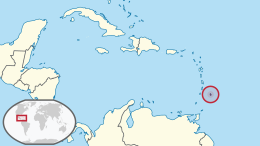Commons:Copyright rules by territory/Barbados/pl
|
Zasady prawa autorskiego: Barbados Skrót: COM:BARBADOS | |
 | |
 | |
| Czas trwania | |
|---|---|
| Standard | Ponad 50 lat życia |
| Anonimowy | Ponad 50 lat od publikacji |
| Audiowizualny | Ponad 50 lat od utworzenia/publikacji |
| Inne | |
| Wolność panoramy | For 3D works and works of artistic craftsmanship |
| Terminy obowiązują do końca danego roku | Tak |
| ISO 3166-1 alpha-3 | BRB |
| Traktaty | |
| Konwencja berneńska | 30 lipca 1983 |
| Członkostwo WTO | 1 stycznia 1995 |
| Data przywrócenia URAA* | 1 stycznia 1996 |
| Traktat WIPO | 13 grudnia 2019 |
| *Praca jest zwykle chroniona w Stanach Zjednoczonych, jeśli jest rodzajem dzieła chronionego prawami autorskimi w USA, opublikowane po cenie 1$ i chronione w kraju pochodzenia w dniu URAA. | |
This page provides an overview of copyright rules of Barbados relevant to uploading works into Wikimedia Commons. Note that any work originating in Barbados must be in the public domain, or available under a free license, in both Barbados and the United States before it can be uploaded to Wikimedia Commons. If there is any doubt about the copyright status of a work from Barbados, refer to the relevant laws for clarification.
Tło
Barbados was an English or British colony from 1627 to 1966. Barbados became an independent state on 30 November 1966 and transitioned to be a republic in 2021, with no formal relationship with the United Kingdom.
Barbados has been a member of the Berne Convention since 30 July 1983, the World Trade Organization since 1 January 1995 and the WIPO Copyright Treaty since 13 December 2019.[1]
As of 2018 the World Intellectual Property Organization (WIPO), an agency of the United Nations, listed the Copyright Act, 1998 (Cap. 300)(as revised up to 2006) as the main copyright law enacted by the legislature of Barbados.[1] WIPO holds the text of this law in their WIPO Lex database.[2]
Ogólne zasady
Under the Copyright Act 1998 revised up to 2006,
- Subject to the provisions of this section, copyright in any literary, dramatic, musical or artistic work exists for the life of the author and for the 50 calendar years following his death.[Cap.300/2006 Section 10(1)]
- When copyright is vested jointly in more than one author, the copyright exists for the life of the last surviving author and for 50 calendar years immediately following the year of his death.[Cap.300/2006 Section 10(2)]
- Where the author is unknown, copyright exists for the 50 calendar years immediately following the year in which the work was first published.[Cap.300/2006 Section 10(3)]
- For a computer-generated work, the copyright in expires at the end of the period of 50 calendar years following the calendar year in which the work was made.[Cap.300/2006 Section 10(4)]
- Copyright in a sound recording or film exists for the 50 calendar years immediately following the calendar year in which it was made or, where it is made available to the public before the end of that period, 50 calendar years immediately following the calendar year in which it is so made available.[Cap.300/2006 Section 11(1)]
- Copyright in a broadcast or cable programme exists for the 50 calendar years immediately following the calendar year in which the broadcast was made or the programme included in a cable programme service.[Cap.300/2006 Section 12(1)]
The Copyright Bill 2023, which is currently in the House of Assembly but has not been passed, would extend the durations to 70 years from 50 years.
Folklore: not free
Zobacz także: Commons:Paying public domain/pl
In respect of folklore, that is to say, all literary and artistic works that constitute a basic element of the traditional and cultural heritage of Barbados; were created in Barbados by various groups of the community; and survive from generation to generation, the rights of the author vest in the Crown to the same extent as if the Crown had been the original creator of the folklore.[Cap.300/2006 Section 22(5)] The rights of the Crown in respect of folklore are enforceable at the instance of the Attorney-General.[Cap.300/2006 Section 22(6)]
Wolność panoramy
Zobacz także: Commons:Wolność panoramy
![]() for 3D works and works of artistic craftsmanship,
for 3D works and works of artistic craftsmanship, ![]() Nie OK for 2D artwork. Use {{FoP-Barbados}} for images of compliant public artistic works of Barbados.
Nie OK for 2D artwork. Use {{FoP-Barbados}} for images of compliant public artistic works of Barbados.
Under the Copyright Act 1998 revised up to 2006, copyright in a work is not infringed by its incidental inclusion in an artistic work, sound recording, film, broadcast or cable programme.[Cap.300/2006 Section 54(a)]
This section [73] applies to buildings; sculptures, models of buildings and works of artistic craftsmanship, if permanently situated in a public place or on premises open to the public.[Cap.300/2006 Section 73(1)] The copyright in a work referred to in subsection (1) is not infringed by making a graphic work representing it; making a photograph or film of it; broadcasting or including in a cable programme service a visual image of it; or issuing to the public copies, or the broadcasting or including in a cable programme service anything whose making was, by virtue of this section, not an infringement of copyright.[Cap.300/2006 Section 73(2)]
Barbadian law is modelled on UK law, and in the absence of any specific case law to the contrary it is reasonable to assume that the rules will be similar. See the COM:FOP United Kingdom for more details.
Zobacz też
Przypisy
- ↑ a b Barbados Copyright and Related Rights (Neighboring Rights). WIPO: World Intellectual Property Organization (2018). Retrieved on 2018-11-04.
- ↑ Copyright Act, 1998 (Cap. 300)(as revised up to 2006). Barbados (2006). Retrieved on 2018-11-04.